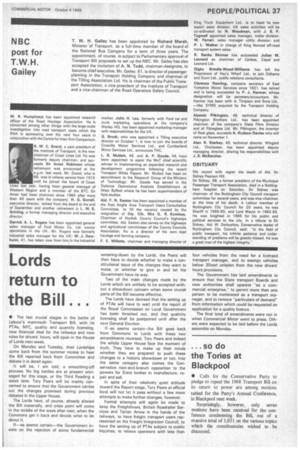Lords return to the Bill ...
Page 39

If you've noticed an error in this article please click here to report it so we can fix it.
• The last crucial stages in the battle of Labour's mammoth Transport Bill, with its PTAs, NFC, quality and quantity licensing, new financial deal for the railways and new rules for drivers' hours, will open in the House of Lords next week.
On Monday and Tuesday, their Lordships come back from the summer recess to hear the Bill reported back from Committee and debate it in detail again.
It will be. I am told, a smoothing-off process. No big battles are at present envisaged for this stage, or the Third Reading a week later. Tory Peers will be mainly concerned to ensure that the Government carries out the changes promised during previous debates in the Upper House.
The Lords have, of course, already altered the Bill materially, and crisis point will come in the middle of the week after next, when the Commons get it back and decide what to do about it.
If—as seems certain—the Government insists on the rejection of some fundamental
watering-down by the Lords, the Peers will then have to decide whether to make a constitutional issue of the changes they want to make, or whether to give in and let the Government have its way.
Two of the main changes made by the Lords which are unlikely to be accepted without a showdown concern when some crucial parts of the Bill become effective.
Tne Lords have decreed that the setting up of PTAs will have to wait until the report of the Royal Commission on Local Government has been thrashed out, and that quantity licensing shall be postponed until after the next General Election.
If -as seems certain-the Bill goes back from Commons to Lords with these two amendments reversed, Tory Peers and indeed the whole Upper House face the moment of truth. They have to make up their minds whether they are prepared to push these changes to a historic showdown or not. Into the same category also comes the Conservative root-and-branch opposition to the powers for State bodies to manufacture, repair and sell.
In spite of their relatively quiet attitude toward the Report stage, Tory Peers at official level will not let it pass without a few more attempts to make further changes, however.
Formal attempts will again be made to keep the Freightliners, British Roadrailer Services and Tartan Arrow in the hands of the railways, to have freight transport users represented on the Freight Integration Council, to have the setting up of PTAs subject to public inquiries, to relieve operators with less than four vehicles from the need for a licensed transport manager, and to exempt vehicles below 30cwt unladen from the new drivers' hours provisions.
The Government has laid amendments to ensure that the State transport Boards and new authorities shall operate "as a commercial enterprise," to permit more than one person to be nominated as a transport manager, and to remove "particulars of demand" from information which could be requested on application for a quality licence.
The final total of amendments were not in when Commercial Motor went to press. Others were expected to be laid before the Lords assemble on Monday.












































































































